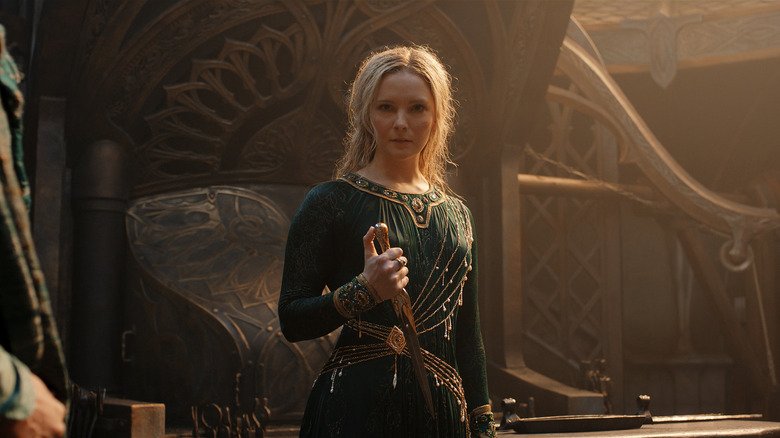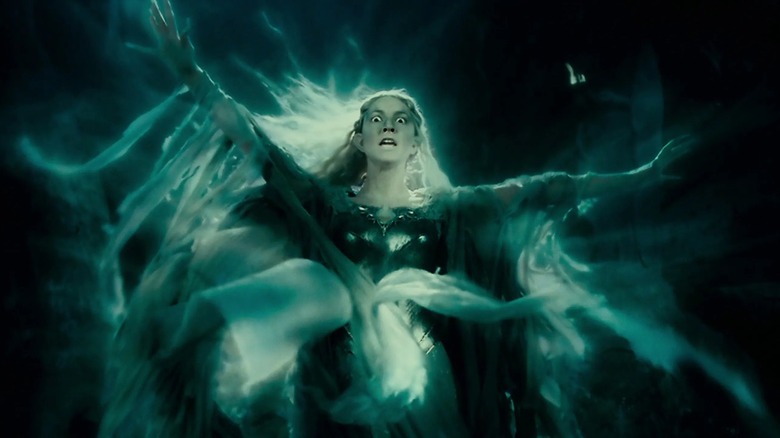How The Rings Of Power Foreshadows Galadriel's Dark Vision In The Lord Of The Rings
(Warning: Spoilers for the finale of "The Lord of the Rings: The Rings of Power" will follow.)
Despite the popular conception of "The Lord of the Rings" as a simple and straightforward tale about good overcoming evil, the journey that Morfyyd Clark's younger and brasher Galadriel embarked on throughout the first season of "The Rings of Power" repeatedly focused on the great evil that even a righteous elven warrior is capable of succumbing to. Her tendency to be reckless — first with driving her fellow warriors so hard in the premiere during her hunt for Sauron that they essentially mutinied against her, and eventually reaching a boiling point as she threatened genocide against orcs to the point of making them sympathetic — might seem like it stands at odds with her far more graceful and measured portrayal in "The Lord of the Rings." But does it, really?
The season finale of "The Rings of Power" has been making headlines for finally revealing the face of Sauron, hiding in plain sight all along, but its biggest concern centered on Galadriel's increasingly fraught battle within herself. The character we previously knew as Halbrand (Charlie Vickers) makes this internal struggle all the more intense as he subjects the elf to a downright biblical round of temptations in an attempt to sway her to his side. In fact, he even goes so far as to goad her with the line that she may become "stronger than the foundations of the earth."
Anyone who knows their "The Lord of the Rings" trivia immediately had their ears perk up at this specific line reading, which neatly foreshadows the crossroads that the character will eventually encounter thousands of years later during Sauron's next attempt at world domination. Here's how "The Rings of Power" brings it all together.
Tests and trials
At its core, "The Lord of the Rings" is a story about how heroes must overcome their own innate flaws time and time again. It's clear that showrunners J.D. Payne and Patrick McKay did their homework in staying true to this theme — particularly when it comes to Galadriel rising above her own ambitions and personal grievances.
As we saw director Peter Jackson bring to life in such vivid detail in "The Fellowship of the Ring," Galadriel is faced with yet more temptation when our surviving heroes — one of whom is carrying Sauron's corrupting One Ring that must be destroyed at all costs — stumble into her elven kingdom of Lothlórien. When she visits the ringbearer, Frodo Baggins, and shows him visions of what may come to pass should he fail in his quest, the terrified hobbit offers the elven queen the Ring for herself — a well-intentioned plea that she quickly dispels him of, due to the dire consequences that would almost certainly follow. In one of Jackson's classic stylistic flourishes (though largely taken straight from J.R.R. Tolkien's own words), Galadriel transforms before Frodo's eyes into a dark and terrible vision of a tyrant queen, "treacherous as the seas" and "stronger than the foundations of the earth."
"The Rings of Power" artfully parallels this sequence by having the sinister Halbrand/Sauron echo that latter line of dialogue, allowing viewers to imagine that Galadriel is actually recalling this earlier interaction from thousands of years prior when she demonstrates her power to Frodo. As we know, Galadriel passes this test and rejects Sauron's advances — and, as a result, her own darker impulses. Perhaps the greatest trick "The Rings of Power" pulls is providing brand-new context for moments we already thought we knew. Now, please excuse us as we diminish into the west.

